![Faraday As A Discoverer: [Illustrated & Biography Added]](https://platform-permanent.ddimg.cn/pt-media-info-soa-resource/digital/product/47/24/1901164724_ii_cover.jpg?version=eff250ca-e17f-4718-971c-9a91a135e3e1)
Faraday As A Discoverer: [Illustrated & Biography Added]
¥27.80
Michael Faraday (1791 –1867) was an English scientist who contributed to the fields of electromagnetism and electrochemistry. His main discoveries include those of electromagnetic induction, diamagnetism and electrolysis. Although Faraday received little formal education, he was one of the most influential scientists in history. It was by his research on the magnetic field around a conductor carrying a direct current that Faraday established the basis for the concept of the electromagnetic field in physics. Faraday also established that magnetism could affect rays of light and that there was an underlying relationship between the two phenomena. He similarly discovered the principle of electromagnetic induction, diamagnetism, and the laws of electrolysis. His inventions of electromagnetic rotary devices formed the foundation of electric motor technology, and it was largely due to his efforts that electricity became practical for use in technology. As a chemist, Faraday discovered benzene, investigated the clathrate hydrate of chlorine, invented an early form of the Bunsen burner and the system ofoxidation numbers, and popularised terminology such as anode, cathode, electrode, and ion. Faraday ultimately became the first and foremost Fullerian Professor of Chemistry at the Royal Institution of Great Britain, a life-time position.. Faraday was an excellent experimentalist who conveyed his ideas in clear and simple language; his mathematical abilities, however, did not extend as far as trigonometry or any but the simplest algebra. James Clerk Maxwell took the work of Faraday and others, and summarized it in a set of equations that is accepted as the basis of all modern theories of electromagnetic phenomena. On Faraday's uses of the lines of force, Maxwell wrote that they show Faraday "to have been in reality a mathematician of a very high order – one from whom the mathematicians of the future may derive valuable and fertile methods." The SI unit of capacitance is named in his honour: the farad. Albert Einstein kept a picture of Faraday on his study wall, alongside pictures of Isaac Newton and James Clerk Maxwell. Physicist Ernest Rutherford stated; "When we consider the magnitude and extent of his discoveries and their influence on the progress of science and of industry, there is no honour too great to pay to the memory of Faraday, one of the greatest scientific discoverers of all time". ABOUT AUTHOR: John Tyndall (1820 – 1893) was a prominent 19th-century Irish physicist. His initial scientific fame arose in the 1850s from his study of diamagnetism. Later he made discoveries in the realms of infrared radiation and the physical properties of air. Tyndall also published more than a dozen science books which brought state-of-the-art 19th century experimental physics to a wide audience. From 1853 to 1887 he was professor of physics at the Royal Institution of Great Britain in London. Tyndall was born in Leighlinbridge, County Carlow, Ireland. His father was a local police constable, descended from Gloucestershire emigrants who settled in southeast Ireland around 1670. Tyndall attended the local schools in County Carlow until his late teens, and was probably an assistant teacher near the end of his time there. Subjects learned at school notably included technical drawing and mathematics with some applications of those subjects to land surveying. He was hired as a draftsman by the Ordnance Survey of Ireland in his late teens in 1839, and moved to work for the Ordnance Survey for Great Britain in 1842. In the decade of the 1840s, a railroad-building boom was in progress, and Tyndall's land surveying experience was valuable and in demand by the railway companies. Between 1844 and 1847, he was lucratively employed in railway construction planning. In 1847 Tyndall opted to become a mathematics and surveying teacher at a boarding school (Queenwood College) in Hampshire. Recalling this decision later, he wrote: "the desire to grow intellectually did not forsake me; and, when railway work slackened, I accepted in 1847 a post as master in Queenwood College." Another recently arrived young teacher at Queenwood was Edward Frankland, who had previously worked as a chemical laboratory assistant for the British Geological Survey. Frankland and Tyndall became good friends. On the strength of Frankland's prior knowledge, they decided to go to Germany to further their education in science. Among other things, Frankland knew that certain German universities were ahead of any in Britain in expe-rimental chemistry and physics. (British universities were still focused on classics and mathematics and not laboratory science.)The pair moved to Germany in summer 1848 and enrolled at the University of Marburg, where Robert Bunsen was an influential teacher. Tyndall studied under Bunsen for two years.

Recep Tayyip Erdo?an'l? Y?llar
¥27.80
Bu kitapta Türkiye Cumhuriyeti'nin Atatürk'ten sonra gelen en ba?ar?l? lideri Recep Tayyip Erdo?an'?n siyasi hayat? ve ?zellikle icraat?n ba??nda oldu?u Ba?bakanl?k d?nemi yer almaktad?r. Ba?bakanl?k d?neminde ya?anan siyasi ve gündemi olu?turan olaylar kronolojik olarak s?ralanm??t?r. Bu eserde "Ba?ar?l? bir siyaset?i nas?l olunur?" sorusunun cevab?, 13 y?ll?k Ba?bakanl?k yapt??? g?revinde nas?l ba?ar?l? oldu?unun yan?t?, Recep Tayyip Erdo?an'?n hayat?ndan kesitler ve Recep Tayyip Erdo?an'?n farkl? konulardaki de?erlendirmeleri ve g?rü?leri vard?r. Ayr?ca Recep Tayyip Erdo?an'?n karakteri, ald??? ?düller ve yabanc?lar?n g?zünden Recep Tayyip Erdo?an hakk?nda yorumlar yer almaktad?r. "Yeni Türkiye" olarak tan?mlad??? Recep Tayyip Erdo?an'?n Türkiye'sinden bizim almam?z gereken dersler de elbette vard?r...Recep Tayyip Erdo?an, 26 ?ubat 1954'te ?stanbul'un Kas?mpa?a semtinde ailesinin ü?üncü ?ocu?u olarak do?du. Ahmet Erdo?an'?n Tenzile Erdo?an'la olan ikinci evlili?inden bir erkek ?ocu?u, Recep Tayyip dünyaya geldi. Babas?n?n, bir ?nceki evlili?inden iki ?ocu?u daha vard?. Recep Tayyip Erdo?an'?n biri k?z d?rt karde?i vard?. Deniz Hatlar?'nda k?y? kaptan? olarak ?al??an "Reis Kaptan" lakapl? baba Ahmet Erdo?an, o?luna babas?n?n ad? olan Tayyip ad?n? koydu. Eski takvime g?re Recep ay?nda do?an bebe?e Recep ad? da verildi. Recep Tayyip Erdo?an'?n ailesi, Recep Tayyip Erdo?an 13 ya??ndayken Rize'nin eski ad?yla Potamya yeni ad?yla Güneysu il?esinden, yokluk ve i?sizlik nedeniyle ?stanbul'un Kas?mpa?a semtine g?? etti. Recep Tayyip Erdo?an'?n babas? Sahil Güvenlik Te?kilat?nda g?revli oldu?u i?in ?ocuklu?u Rize'de ge?ti. Babas?, o d?nemin “?irket-i Hayriye”si günümüzün Denizyollar?'nda kaptanl?k yapt? ve ve k?y? kaptanl???ndan emekli oldu. Recep Tayyip Erdo?an, o günleri anlat?rken babas?n?n ?stanbul'un varo?lar?nda ko?turdu?unu belirterek, gelecekte nas?l bir ya?am olmas? gerekti?ini ?u s?zlerle ifade ediyordu:“O ?ilelerin i?erisinden geldik. Onlar da oralarda b?yle merdiven altlar?nda odalarda ya?ad?lar. Bunlar? bana a?layarak anlat?rd? rahmetli babam. Biz oralardan geldik. Ama oralarda kalamay?z. Gelecek ku?aklar?m?za da biz oralar? ?rnek olarak veririz ama ‘Orada kal.’ diyemeyiz. Bunlar? ya?ad???m?za g?re gelecek ku?aklara biz ?ok daha farkl? bir Türkiye b?rakmak zorunday?z. O yavrular?m?z ?ok daha farkl? yeti?mek durumunda. E?er ben o?lumu, torunumu bilimde, sanatta her alanda ?ok daha ileri g?türebiliyorsam kendimi ?ok daha ba?ar?l? bir baba ve dede olarak g?rebilirim. E?er g?türemiyorsam o zaman ba?ar?s?z?m, olaya b?yle bakaca??z. Onun i?in bizim bir günümüz di?erine e?it olmamal?. Dün bugünden geri kalmal?. Yar?n bugünden ?ok daha ileri olmal?. Mevlana diyor ya ’Dün dünde kald? canca??z?m yeni bir ?eyler yapmak, s?ylemek laz?m.’ … ??te biz bunu ba?armak durumunday?z.”
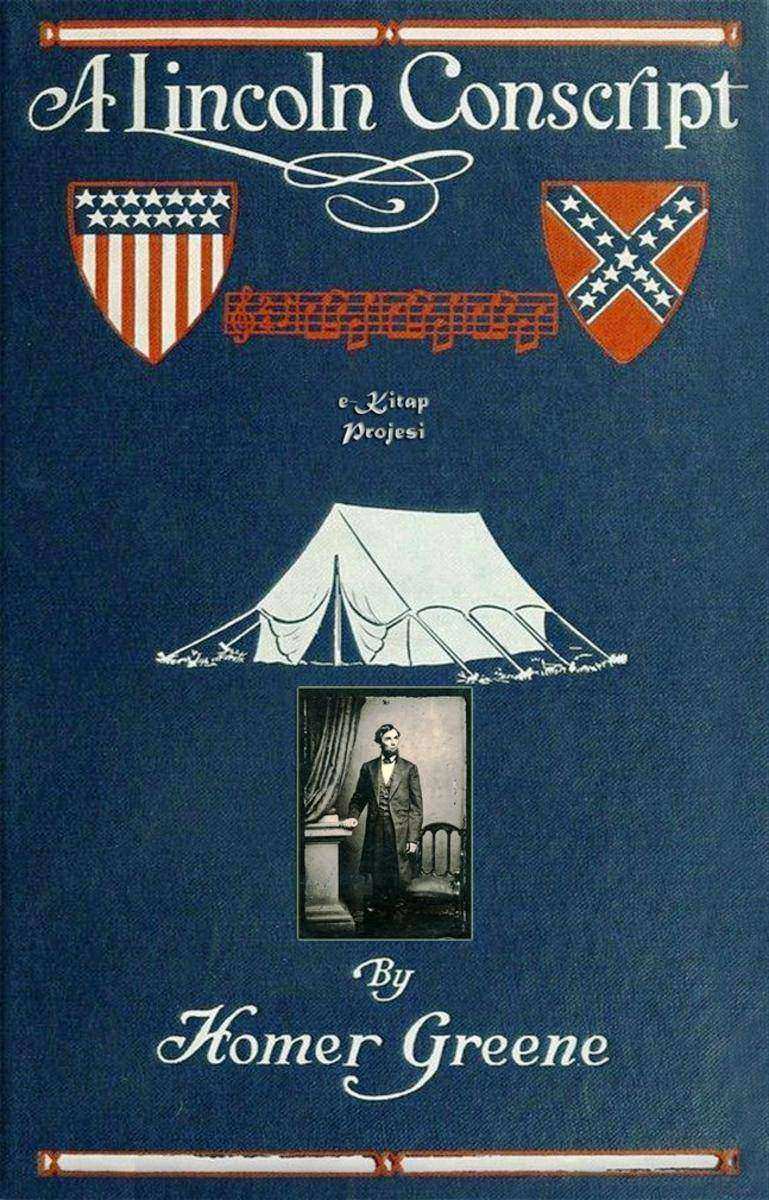
A Lincoln Conscript
¥27.88
On the second day of July in the year 1863 the Civil War in America was at its height. Late in the preceding month Lee had turned his face northward, and, with an army of a hundred thou-sand Confederate soldiers at his back, had marched up into Penn-sylvania. There was little to hinder his advance. Refraining, by reason of strict orders, from wanton destruction of property, his soldiers nevertheless lived on the rich country through which they passed. York and Carlisle were in their grasp. Harrisburg was but a day’s march away, and now, on this second day of July, flushed with fresh victories, they had turned and were giving desperate battle, through the streets and on the hills of Gettysburg, to the Union armies that had followed them. The old commonwealth was stirred as she had not been stirred before since the fall of Sumter. Every town and village in the state responded quickly to the governor’s call for emergency troops to defend the capital city. Mount Hermon, already depleted by gen-erous early enlistments, and by the draft of 1862, gathered to-gether the bulk of the able-bodied men left in the village and its surroundings, and sent them forth in defense of the common-wealth. Not that Mount Hermon was in especial danger from Lee’s invasion, far from it. Up in the northeastern corner of the state, on a plateau of one of the low foot-hills of the Moosic range, sheltered by the mountains at its back, it was well protected, both by reason of distance and location, from the advancing foe. But Mount Hermon was intensely patriotic. In the days preceding the Revolution the sturdy pioneers from Connecticut had met the equally sturdy settlers from the domain of Penn, and on this plateau they had fought out their contentions and settled their differences; the son of the Pennamite had married the daughter of the Yankee; and the new race, with love of country tingeing every drop of its blood a deeper red, had stayed on and possessed the land. So, on this July day, when the armies of North and South were striving and struggling with each other in bloody combat back and forth across the plain and up the hills of Gettysburg, Mount Hermon’s heart beat fast. But it was not for themselves that these people were anxious. It was for the fathers, husbands, sons, lovers in that army with which Meade, untried and unproven, was endeavoring to match the strategy and strength of Lee. News of the first day’s skirmishing had reached the village, and it was felt that a great battle was imminent. In the early evening, while the women were still busy at their household tasks, the men gathered at the post-office and the stores, eager for late news, anxious to discuss the situation as they had learned it. In the meantime the boys of the town had congregated on the village green to resume the military drills which, with more or less frequency, they had carried on during the summer. These drills were not wholly without serious intent. It was play, indeed; but, out of the ranks of these boys, three of the older ones had already gone to the front to fight real battles; and it was felt, by the men of the town, that the boys could not be too thoroughly imbued with the military spirit. So, on this July evening, wakened into new ardor by the news from Gettysburg, they had gathered to resume their nightly work—and play.There were thirty-three of them, ranging in years all the way from eight to eighteen. They were eager and enthusiastic. At the command to fall in there was much pushing and jostling, much striving for desirable places, and even the young captain, with great show of authority, could not quite adjust all differences to the complete satisfaction of his men.Before the confusion had wholly ceased, and while there were still awkward gaps in the ranks, a tall, straight, shy-mannered boy of seventeen, who had remained hitherto on the outskirts of the group, quietly slipped into one of the vacant places.

The Evolution of Modern Orchestration
¥27.88
It is not the purpose of this work to write a treatise on instrumentation or to prepare a pedagogical analysis of orchestration only, but rather to trace the evolu-tion of the orchestra and of orchestration in connection with the history of music proper. Special emphasis will be laid upon what may be termed the IMPELLING FORCES to which the development of orchestration is due. This necessitates a considerable repetition of familiar facts that do not lend themselves to further original treatment. The restatement of such facts, however, would seem to form an indispensable background for the main theme, which is thereby exposed with all its attending phases of logical evolution. In addition to extended studies of orchestral scores themselves, the standard works of Berlioz, Geva?rt, Riemann, Parry, and others have, as a matter of course, been referred to. The subject under discussion has already been admirably handled by Lavoix in his voluminous work entitled "Histoire de L'Instrumentation," but it was unquestionably done through French glasses, and the scores of not one German romanticist are submitted to careful analysis beyond those of Weber and Wagner. "Parsifal" had not been produced at the time when Lavoix's book went to press, nor had such representative composers as Brahms, Saint-Sa?ns, Tschaikowsky, Dvorak then won their full meed of recognition. It is obvious, therefore, that the orchestration especially of the nineteenth century offers a fertile field for further profitable research. Again, the present writer is not aware of the existence of any comprehensive work in the English language upon the history of the orchestra and of orchestration. Throughout these pages the achievements of the more prominent composers are set forth in such manner as to indicate not only the distinctive features of their orchestration but of their general creative ability as well. In each case, the general style of composition and its significance as a contribution to musical literature are first enlarged upon. This is followed by an examination of the differentiated treatment of the strings, the wood, the brass, presented in logical sequence. A final analysis is then made of the individual method of orchestration as a whole, together with its relative value in the evolution of orchestration. In the Appendix to this book will be found a few musical illustrations selected from representative orchestral scores. LOUIS ADOLPHE COERNE. Cambridge, Massachusetts, U.S.A.April 30, 1905.

William the Conqueror
¥27.88
ALTHOUGH Rouen is now very far before all the other cities of Normandy in point of magnitude and importance, and though Rollo, in his conquest of the country, made it his principal headquarters and his main stronghold, it did not continue exclusively the residence of the dukes of Normandy in after years. The father of William the Conqueror was Robert, who be-came subsequently the duke, the sixth in the line. He resided, at the time when William was born, in a great castle at Falaise. Falaise, as will be seen upon the map, is west of Rouen, and it stands, like Rouen, at some distance from the sea. The castle was built upon a hill, at a little distance from the town. It has long since ceased to be habitable, but the ruins still remain, giving a picturesque but mournful beauty to the eminence which they crown. They are often visited by tra-velers, who go to see the place where the great hero and conqueror was born.??It was about 870 that Rollo was banished from Norway, and a few years after that, at most, that he landed in France. It was not, however, until 912 that he concluded his treaty of peace with Charles, so as to be fully invested with the title of Duke of Normandy. He was advanced in age at this time, and, after spending five years in settling the affairs of his realm, he resigned his dukedom into the hands of his son, that he might spend the remainder of his days in rest and peace. He died in 922, five years after his resignation.??He was only ten years old when his father was assassinated. He became involved in long and arduous wars with the King of France, which compelled him to call in the aid of more Northmen from the Baltic. His new allies, in the end, gave him as much trouble as the old enemy, with whom they came to help William contend; and he found it very hard to get them away. He wanted, at length, to make peace with the French king, and to have them leave his dominions; but they said, "That was not what they came for." Richard had a beautiful daughter, named Emma, who afterward became a very important political personage, as will be seen more fully in a subsequent chapter.?Richard died in 996, after reigning fifty-four years.
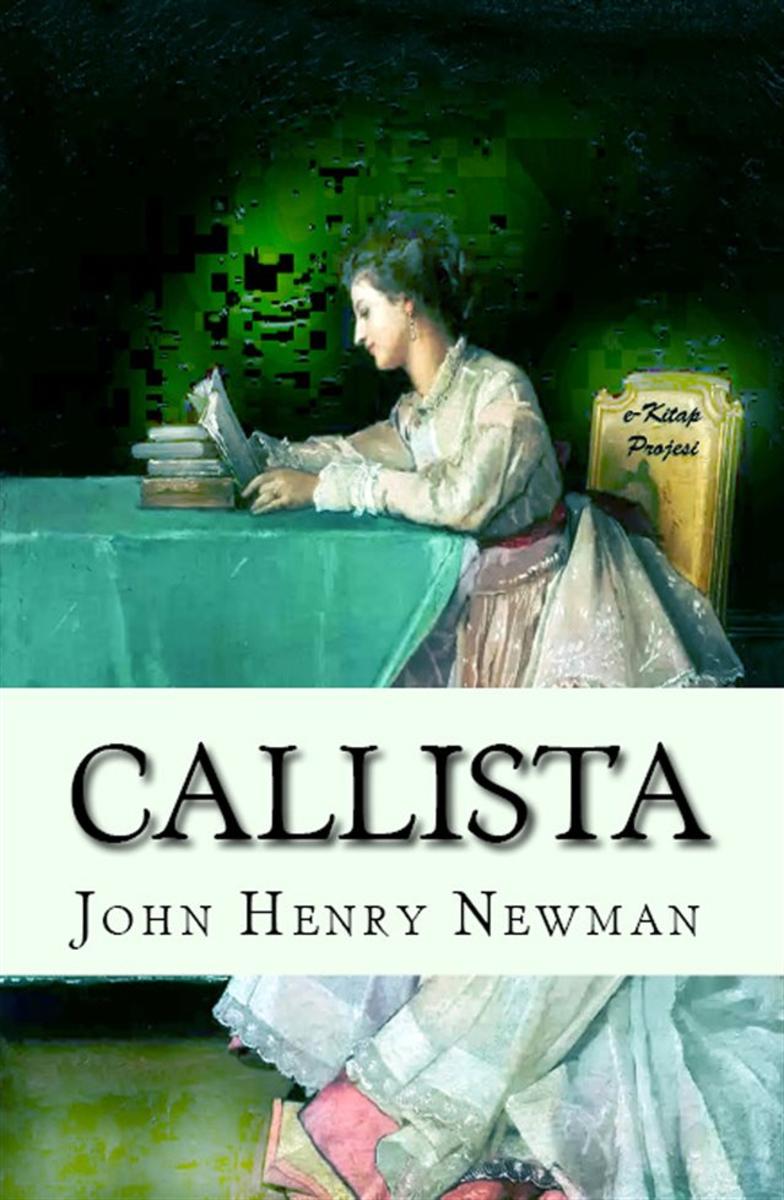
Callista: (A Tale of the Third Century)
¥27.88
“Love thy God, and love Him only,And thy breast will ne’er be lonely.In that One Great Spirit meetAll things mighty, grave, and sweet.Vainly strives the soul to mingleWith a being of our kind;Vainly hearts with hearts are twined:For the deepest still is single.An impalpable resistanceHolds like natures still at distance.Mortal: love that Holy One,Or dwell for aye alone.”De Vere In no province of the vast Roman empire, as it existed in the middle of the third century, did Nature wear a richer or a more joyous garb than she displayed in Proconsular Africa, a territory of which Carthage was the metropolis, and Sicca might be considered the centre. The latter city, which was the seat of a Roman colony, lay upon a precipitous or steep bank, which led up along a chain of hills to a mountainous track in the direction of the north and east. In striking contrast with this wild and barren region was the view presented by the west and south, where for many miles stretched a smiling champaign, exuberantly wooded, and varied with a thousand hues, till it was terminated at length by the successive tiers of the Atlas, and the dim and fantastic forms of the Numidian mountains. The immediate neighbourhood of the city was occupied by gardens, vineyards, corn-fields, and meadows, crossed or encircled here by noble avenues of trees or the re-mains of primeval forests, there by the clustering groves which wealth and luxury had created. This spacious plain, though level when compared with the northern heights by which the city was backed, and the peaks and crags which skirted the southern and western horizon, was discovered, as light and shadow travelled with the sun, to be diversified with hill and dale, upland and hollow; while orange gardens, orchards, olive and palm plantations held their appropriate sites on the slopes or the bottoms. Through the mass of green, which extended still more thickly from the west round to the north, might be seen at intervals two solid causeways tracking their persevering course to the Mediterranean coast, the one to the ancient rival of Rome, the other to Hippo Regius in Numidia. Tourists might have complained of the absence of water from the scene; but the native peasant would have explained to them that the eye alone had reason to be discontented, and that the thick foliage and the uneven surface did but conceal what mother earth with no niggard bounty supplied. The Bagradas, issuing from the spurs of the Atlas, made up in depth what it wanted in breadth of bed, and ploughed the rich and yielding mould with its rapid stream, till, after passing Sicca in its way, it fell into the sea near Carthage. It was but the largest of a multitude of others, most of them tributaries to it, deepening as much as they increased it. While channels had been cut from the larger rills for the irrigation of the open land, brooks, which sprang up in the gravel which lay against the hills, had been artificially banked with cut stones or paved with pebbles; and where neither springs nor rivulets were to be found, wells had been dug, sometimes to the vast depth of as much as 200 fathoms, with such effect that the spurting column of water had in some instances drowned the zealous workmen who had been the first to reach it. And, while such were the resources of less favoured localities or seasons, profuse rains descended over the whole region for one half of the year, and the thick summer dews compensated by night for the daily tribute extorted by an African sun.
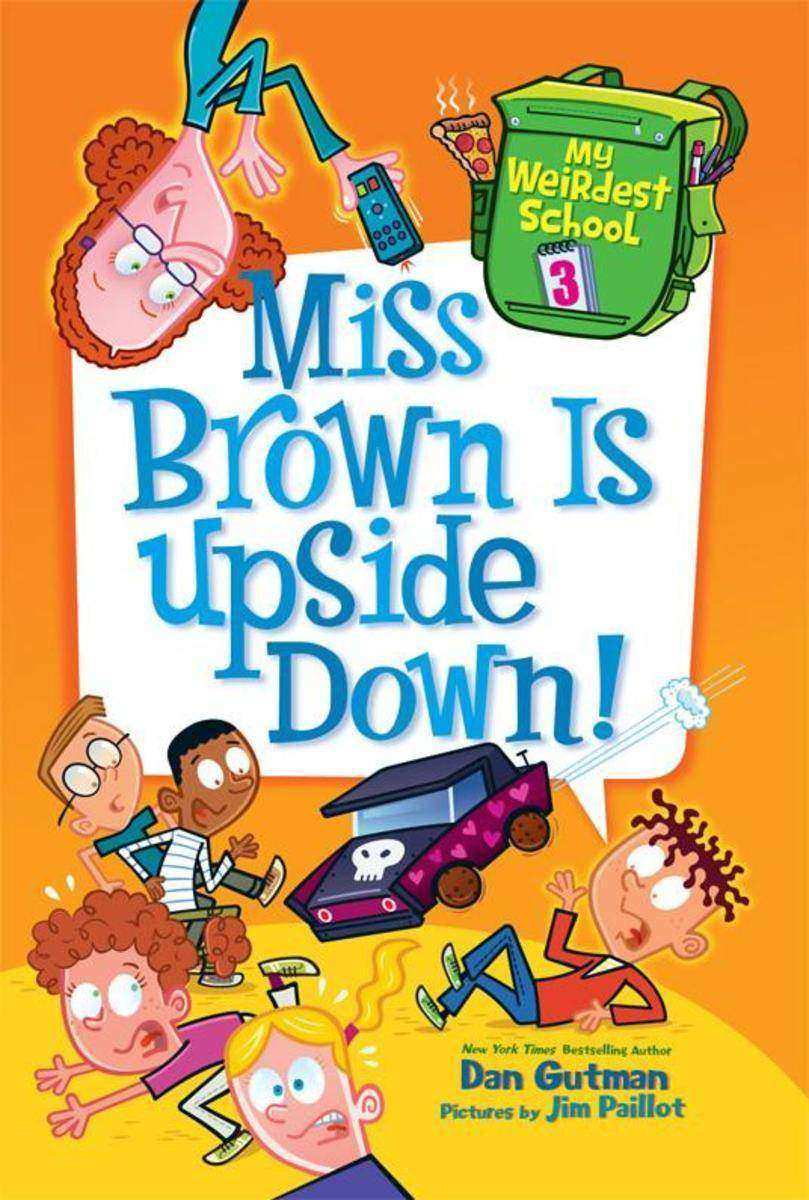
My Weirdest School #3: Miss Brown Is Upside Down!
¥27.94
With more than 9 million books sold, the My Weird School series really gets kids reading!In this third book in the new My Weirdest School series, the Brain Games are coming to Ella Mentry School! Miss Brown will help the kids do creative projects, like building a bridge out of toothpicks and designing a remote control car. But the kids are up against some tough competition. They will have to compete against the students of Dirk School to win the grand prize: a free trip to PizzaWorld!Perfect for reluctant readers and word lovers alike, Dan Gutman's hugely popular My Weird School series has something for everyone. Don't miss the hilarious adventures of A.J. and the gang.

My Weirdest School #1: Mr. Cooper Is Super!
¥27.94
With more than 8 million books sold, My Weird School really gets kids reading!In this first book in the hilarious new My Weirdest School series, part of the internationally bestselling My Weird School series, A.J.'s third-grade teacher, Mr. Granite, is retiring after a million hundred years. It turns out the new teacher, Mr. Cooper, is even weirder than Mr. Granite! One day he's Rat Man and he teaches about rodents. The next day he's Lava Man and he teaches about volcanoes. But what happens when a real superhero is neededWill Mr. Cooper protect the school from evil, or just embarrass it to death?Perfect for reluctant readers and word lovers alike, Dan Gutman's hugely popular My Weird School series has something for everyone. Don't miss the hilarious adventures of A.J. and the gang.
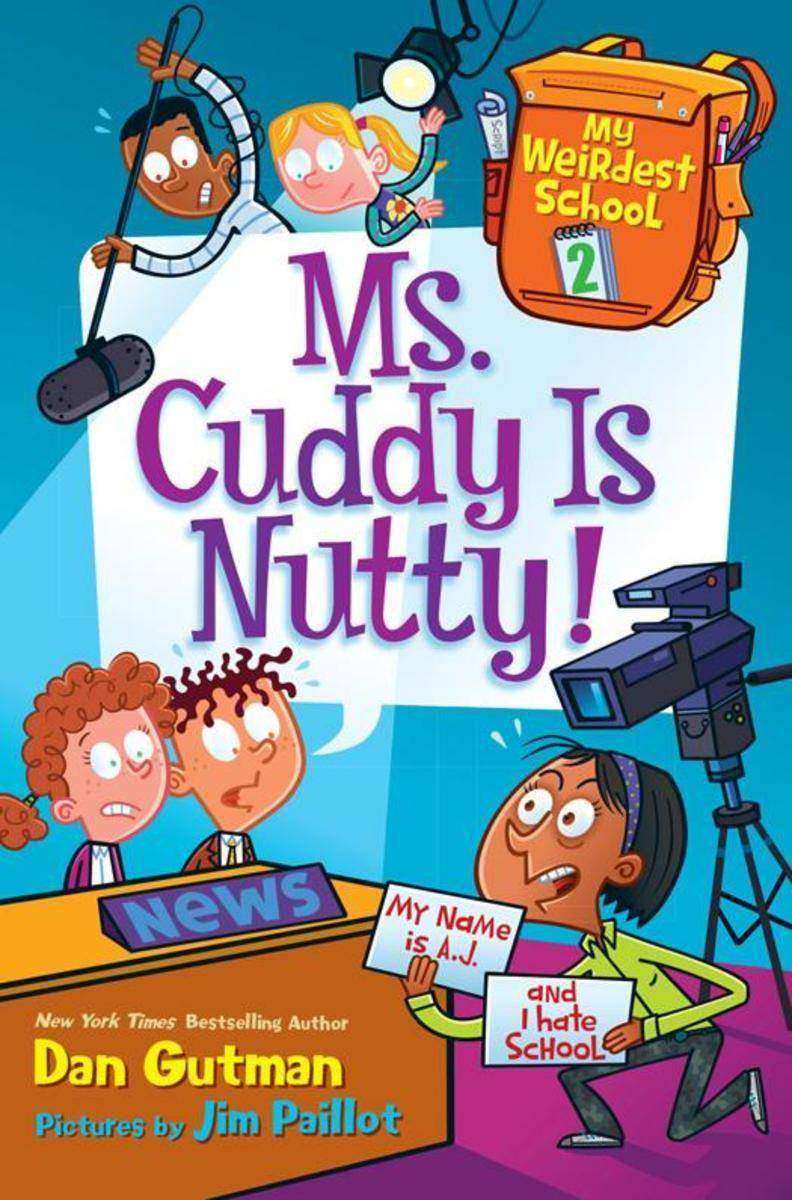
My Weirdest School #2: Ms. Cuddy Is Nutty!
¥27.94
With more than 8 million books sold, the My Weird School series really gets kids reading!In this second book in the new My Weirdest School series, the students of Ella Mentry School are about to get a wonderful gift—a million dollars! A.J. and the gang vote to create an in-school, state-of-the-art TV station so the morning announcements can be broadcast to all the classes. There's even enough money to hire Ms. Cuddy, a new digital media arts teacher who knows a thing or two about broadcasting. But soon Ms. Cuddy decides the ratings on the announcements are too low, and the show needs to "get more eyeballs." What could possibly go wrong?Perfect for reluctant readers and word lovers alike, Dan Gutman's hugely popular My Weird School series has something for everyone. Don't miss the hilarious adventures of A.J. and the gang.

A magas f?ben: Teljes gázzal
¥27.96
A magas f?ben: Teljes gázzal

白痴(英语文库)
¥27.99
本书作为我社“*经典英语文库”第14辑中的一种,精选由俄国著名作家F. 陀思妥耶夫斯基的经典作品《白痴》。作品对农奴制改革后俄国上层社会作了广泛的描绘,涉及复杂的心理和道德问题。表达了世界本是就是无法用理性去量化的,甚至是超越人的想象的。人无可探知、无法实现的都是不需要去思考的,去思考且去实践的人都是“白痴”这一深刻见解。

Fart Squad #2: Fartasaurus Rex
¥28.01
It’s the second adventure from the smelt-it, dealt-it, you-can-fasten-your-seat-belt-but-they-might-melt-it . . . fearless FART SQUAD! This laugh-out-loud chapter book series is perfect for Captain Underpants fans. With black-and-white illustrations throughout and port-a-potties full of bathroom humor, young readers will be giggling from start to finish.When Darren Stonkadopolis and the rest of the Fart Squad are bussed off to the Natural History Museum, Darren melts a petrified tar pit with a volcano-hot fart. And when he does, he lets out what the pit had been holding in—the deadliest farter in all history, the ferocious Fartasaurus Rex. Now it’s up to the Fart Squad to chow down, power up, and blast this prehistoric beast back to the Flatulent Age before the whole town becomes fossil fuel!“If you can smell what this dino had for lunch, you might be dinner!”—It’s a Gas with Smooth Flo on WCPU“Fart attacks are up 82 percent all over the city. Sneak fart attacks are up 90 percent.”—Good Morning, Buttzville“The business end of this dino means business!”—PassingtonPost.com

The Fairy Bell Sisters #5: Sylva and the Lost Treasure
¥28.01
Readers of Disney Fairies, The Never Girls, and Rainbow Magic will absolutely love the fifth book in the Fairy Bell Sisters series by Margaret McNamara, a delightful chapter-book series about Tinker Bell's little sisters for kids ages 6-10.Springtime means spring-cleaning for the fairies of Sheepskerry Island. It also means getting to search for treasure in the jumble pile—a giant collection of unwanted items outside Queen Mab's palace. When Sylva Bell and her best friend, Poppy Flower, find Queen Mab's old fairy dollhouse in the pile, they are overjoyed! But as the two friends play with it, they start to unlock its secrets and discover its special magic—a magic that has a history of putting friendships to the test.

The Fairy Bell Sisters #6: Christmas Fairy Magic
¥28.01
The Fairy Bell Sisters get in the Christmas spirit in this sixth book in Margaret McNamara’s delightful chapter-book series about Tinker Bell’s little sisters, perfect for kids ages 6 to10 who enjoy Disney Fairies, The Never Girls, and Rainbow Magic.There are only ten days left until Christmas, and the Fairy Bell Sisters couldn’t be more excited: this year, their big sister Tinker Bell is coming home to visit! Tink says she’s going to treat her sisters to the very best Christmas by bringing?presents and decorations from Neverland. Then she makes her sisters promise not to do anything to prepare for the holiday—they work hard enough already!But as Christmas draws nearer—and Tink still has not arrived—Clara, Rosy, Goldie, and Sylva find it harder and harder not to join in the Fairyland festivities.?And on top of everything else, baby Squeak has started acting rather strangely. . . . Will the season be ruinedOr will the Fairy Bell Sisters find enough faith in one another to make this the most magical Christmas ever?

The Critique of Pure Reason
¥28.04
Piping down the valleys wild,?Piping songs of pleasant glee,?On a cloud I saw a child,?And he laughing said to me:??"Pipe a song about a Lamb!"?So I piped with merry cheer.?"Piper, pipe that song again;"?So I piped: he wept to hear.??"Drop thy pipe, thy happy pipe;?Sing thy songs of happy cheer!"?So I sang the same again,?While he wept with joy to hear.??"Piper, sit thee down and write?In a book, that all may read."?So he vanish'd from my sight;?And I pluck'd a hollow reed,??And I made a rural pen,?And I stain'd the water clear,?And I wrote my happy songs?Every child may joy to hear. ?
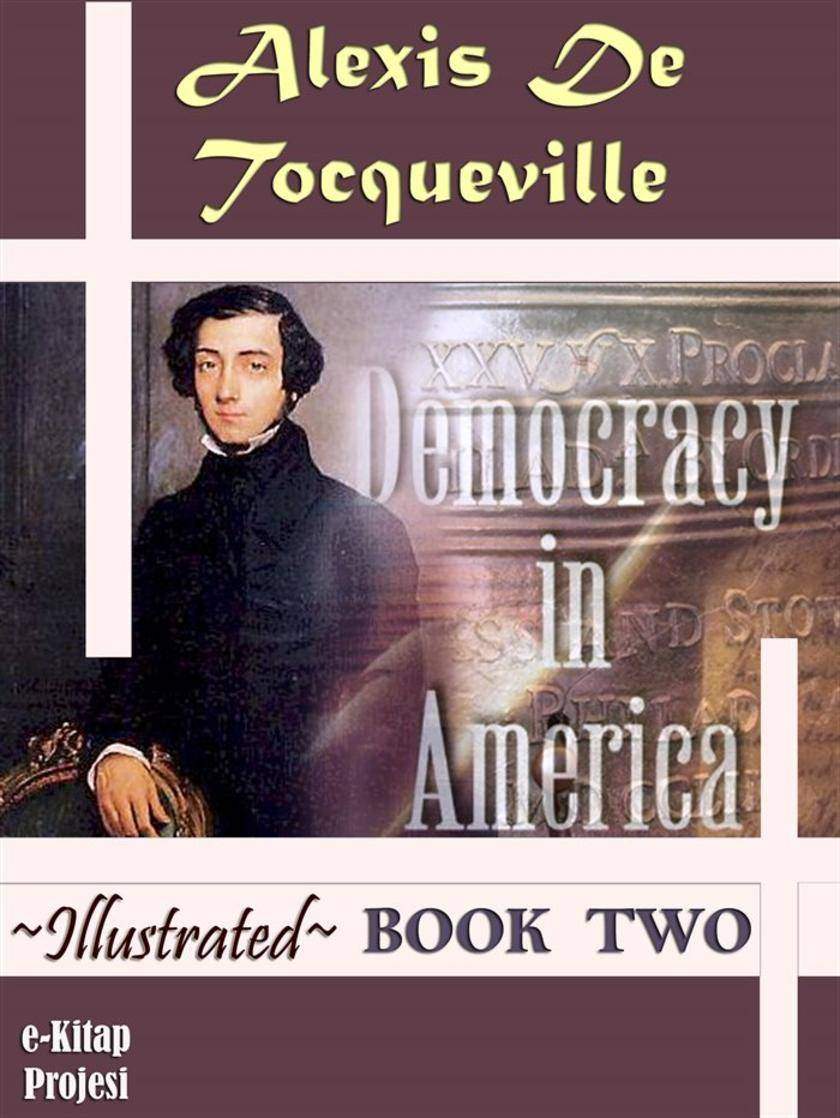
Democracy in America: Book Two
¥28.04
The girl had been an orphan from childhood, and Rowland Trowbridge had been almost as a father to her. Avice loved him and watched over him as a daughter; at least, that had been the case until lately. A few weeks since, Mr. Trowbridge had succumbed to the rather florid charms of Mrs. Black, his housekeeper, and told Avice he would marry her in a month. Though greatly surprised and not greatly pleased, Avice had accepted the situation and treated the housekeeper with the same pleasant courtesy she had always shown her. The two “got along” as the phrase is, though their natures were not in many ways congenial. Avice remained at the window till she saw at last Leslie Hoyt’s tall form approaching. She ran to open the door herself. “Oh, Judge Hoyt,” she cried, “Uncle hasn’t come yet! There must be something wrong! What can we do” THE MARK OF CAINBY CAROLYN WELLS AUTHOR OF “A CHAIN OF EVIDENCE,” “THE GOLD BAG,” “THE WHITE ALLEY,” ETC.WITH A FRONTISPIECE IN COLOR BY GAYLE HOSKINS

The Cradle of Mankind: (Life in Eastern Kurdistan)
¥28.04
Oliver Cromwell, the future Lord Protector of the Commonwealth of England, was born at Huntingdon on April 25, 1599, receiving his baptismal name from his uncle, Sir Oliver Cromwell of Hinchingbrooke, a mansion hard by the little town. It was at Huntingdon that the father of the infant, Robert Cromwell, had established himself, farming lands and perhaps also adding to his income by the profits of a brewhouse managed by his wife, Elizabeth—a descendant of a middle-class Norfolk family of Steward—originally Styward—which, whatever writers of authority may say, was not in any way connected with the Royal House of Scotland. "I was," said Cromwell in one of his later speeches, "by birth a gentleman, living neither in any considerable height nor yet in obscurity. I have been called to several employments in the nation, and—not to be overtedious—I did endeavour to discharge the duty of an honest man in those services to God and His people's interest, and to the Commonwealth." The open secret of Cromwell's public life is set forth in these words:—his aim being: first, to be himself an honest man; secondly, to serve God and the people of God; and thirdly, to fulfil his duty to the Commonwealth. In this order, and in no other, did his obligations to his fellow-creatures present themselves to his eyes. For the work before him it could not be otherwise than helpful that his position in life brought him into contact with all classes of society. What powers and capacities this infant—or indeed any other infant—may have derived from this or the other ancestor, is a mystery too deep for human knowledge; but at least it may be noted that the descent of the Cromwells from Sir Richard Williams, the nephew of Thomas Cromwell, the despotic Minister of Henry VIII., brought into the family a Welsh strain which may have shown itself in the fervid idealism lighting up the stern practical sense of the warrior and statesman.Of Oliver's father little is known; but his portrait testifies that he was a man of sober Puritanism, not much given to any form of spiritual enthusiasm—very unlike his elder brother, Sir Oliver, who had inherited not only the estate, but the splendid ways of his father, Sir Henry Cromwell—the Golden Knight—and who, after running through his property, was compelled to sell his land and to retire into a more obscure position. As the little Oliver grew up, he had before his eyes the types of the future Cavalier and Roundhead in his own family. So far as parental influence could decide the question, there could be no doubt on which side the young Oliver would take his stand. His education was carried on in the free school of the town, under Dr. Beard, the author of The Theatre of God's Judgments Displayed, in which a belief in the constant intervention of Providence in the punishment of offenders was set forth by numerous examples of the calamities of the wicked. Though Oliver afterwards learned to modify the crudeness of this teaching, the doctrine that success or failure was an indication of Divine favour or disfavour never left him, and he was able, in the days of his greatness, to point unhesitatingly to the results of Naseby and Worcester as evidence that God Himself approved of the victorious cause.
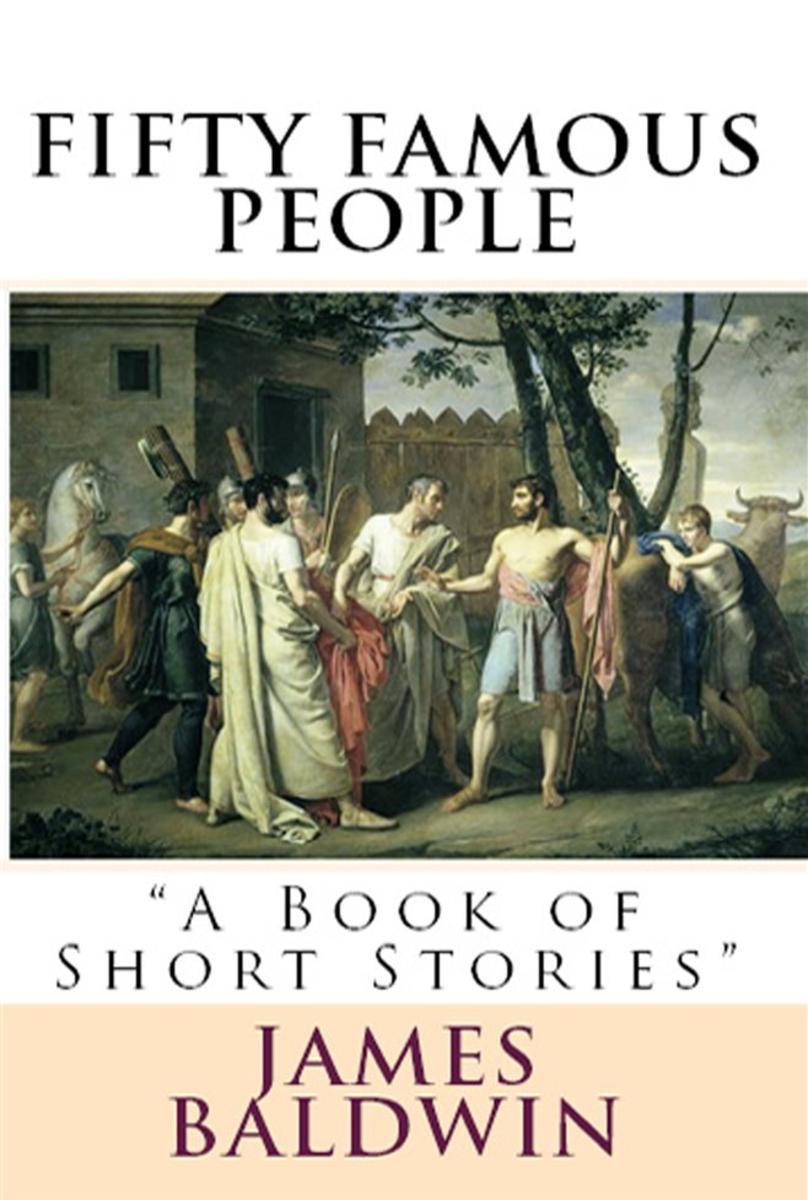
Fifty Famous People: "A Book of Short Stories"
¥28.29
ONE of the best things to be said of the stories in this volume is that, although they are not biographical, they are about real persons who actually lived and performed their parts in the great drama of the world's history. Some of these persons were more famous than others, yet all have left enduring "footprints on the sands of time" and their names will not cease to be remembered. ??In each of the stories there is a basis of truth and an ethical lesson which cannot fail to have a wholesome influence; and each possesses elements of interest which, it is believed, will go far towards proving the fallibility of the doctrine that children find delight only in tales of the imaginative and unreal. The fact that there are a few more than fifty famous people mentioned in the volume may be credited to the author's wish to give good measure.??SAVING THE BIRDS?ONE day in spring four men were riding on horseback along a country road. These men were lawyers, and they were going to the next town to attend court.?There had been a rain, and the ground was very soft. Water was dripping from the trees, and the grass was wet.?The four lawyers rode along, one behind another; for the pathway was narrow, and the mud on each side of it was deep. They rode slowly, and talked and laughed and were very jolly.?As they were passing through a grove of small trees, they heard a great fluttering over their heads and a feeble chirping in the grass by the roadside.? "Stith! stith! stith!" came from the leafy branches above them.?"Cheep! cheep! cheep!" came from the wet grass.?"What is the matter here?" asked the first lawyer, whose name was Speed.?"Oh, it's only some old robins!" said the second lawyer, whose name was Hardin. "The storm has blown two of the little ones out of the nest. They are too young to fly, and the mother bird is making a great fuss about it."?"What a pity! They'll die down there in the grass," said the third lawyer, whose name I forget.?"Oh, well! They're nothing but birds," said Mr. Hardin. "Why should we bother?"? "Yes, why should we?" said Mr. Speed.?The three men, as they passed, looked down and saw the little birds fluttering in the cold, wet grass. They saw the mother robin flying about, and crying to her mate.?Then they rode on, talking and laughing as before. In a few minutes they had forgotten about the birds.?But the fourth lawyer, whose name was Abraham Lincoln, stopped. He got down from his horse and very gently took the little ones up in his big warm hands.
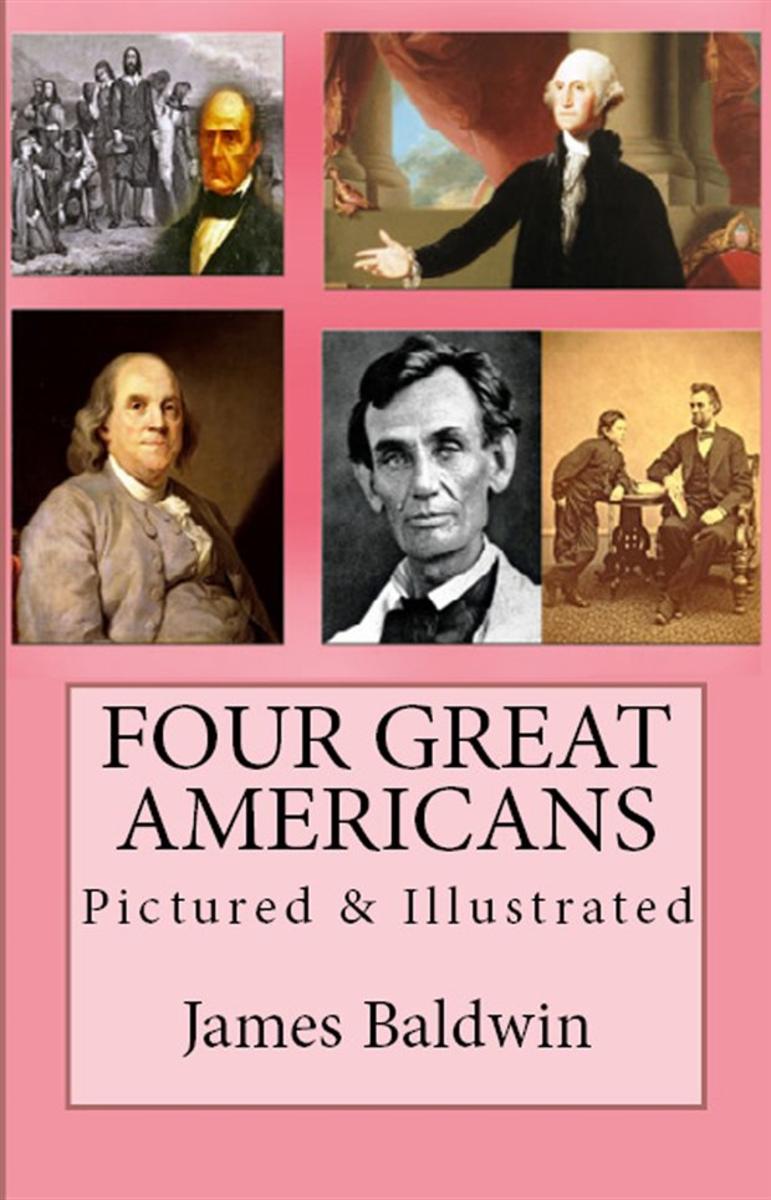
Four Great Americans: Pictured & Illustrated
¥28.29
When George Washington was a boy there was no United States. The land was here, just as it is now, stretching from the Atlantic Ocean to the Pacific; but nearly all of it was wild and unknown.??Between the Atlantic Ocean and the Allegheny Mo-untains there were thirteen colonies, or great settlements. The most of the people who lived in these colonies were English people, or the children of English people; and so the King of England made their laws and appointed their governors.??The newest of the colonies was Georgia, which was settled the year after George Washington was born.?The oldest colony was Virginia, which had been settled one hundred and twenty-five years. It was also the richest colony, and more people were living in it than in any other.??There were only two or three towns in Virginia at that time, and they were quite small.?Most of the people lived on farms or on big plantations, where they raised whatever they needed to eat. They also raised tobacco, which they sent to England to be sold.??The farms, or plantations, were often far apart, with stretches of thick woods between them. Nearly every one was close to a river, or some other large body of water; for there are many rivers in Virginia..
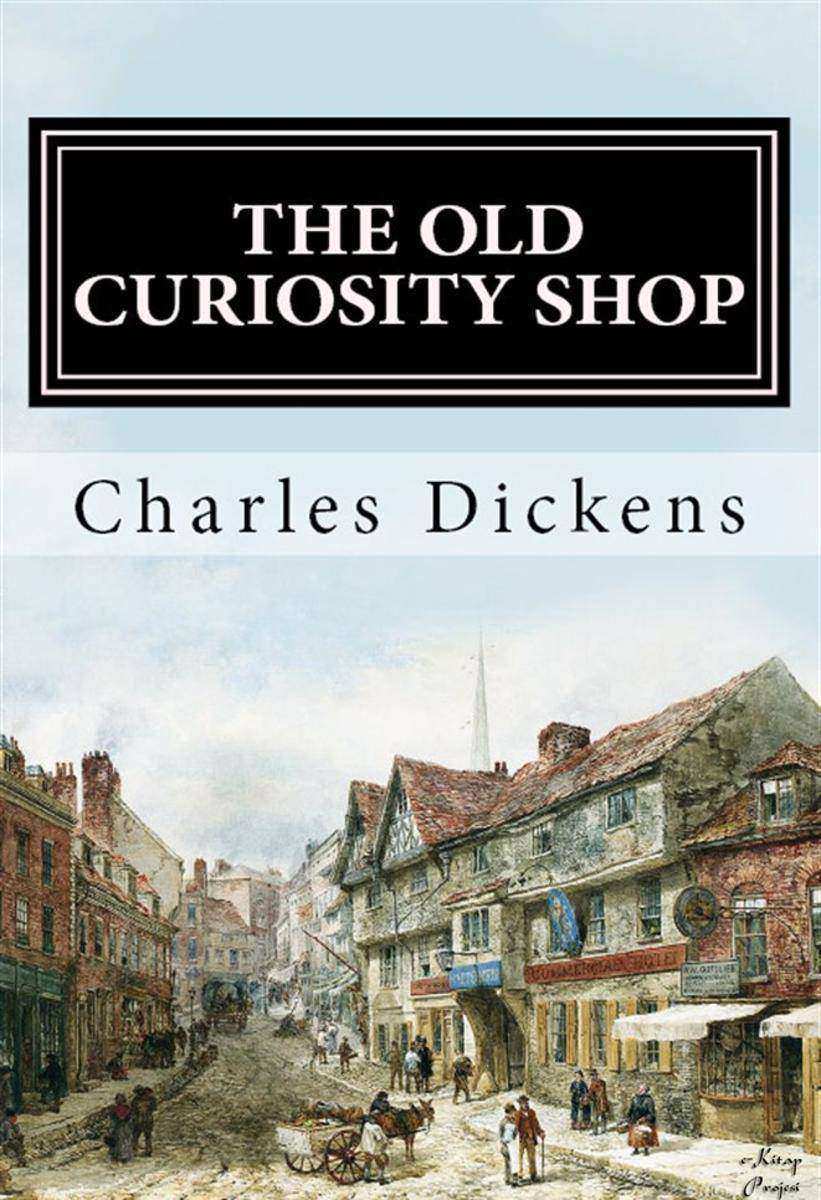
The Old Curiosity Shop
¥28.29
The grandfather of Nell Trent wants to make sure his granddaughter is provided for when he dies. His memory of his daughter’s suffering and premature death gives him a fear of poverty. This obsession results in his financial and physical ruin. Nell and her grandfather flee and embark on a journey that has no destination. For Nell, all she wants is a peaceful existence with enough to subsist on.??They come across many interesting people in their travels and are often met with the kindness of strangers. Yet, underneath an animated and colorful world, they also encounter the bleak reality of the industrial age. From simple villages and fields of flowers, they cross into a dirty city full of mass unemployment and plague victims—where children die from starvation and are left on the curb.??The story isn’t just about Nell and her grandfather, but the people who are connected to them directly or indirectly. There is Richard Swiveller, a careless young man who is a friend of Nell’s plotting brother, who wants Swiveller to marry Nell for the fortune he thinks she has. Daniel Quilp, the malicious dwarf, has a vendetta against the grandfather—who was the one person who managed to fool him. There is honest Kit, who finds himself the victim of spite of people he never harmed. Kit desires to help Nell, whoM he worships as a personal angel that has always inspired the best in him. The mysterious Bevis Marks, who is a generous patron to some and an enemy to others, also has his own reasons for finding Nell and her grandfather.??Unique to this book, unlike Dickens other works, is a fairy tale quality to the story. It is certainly a book of contrasts: the purity of Nell compared to the sadistic depravity of Quilp, fresh air and scenic villages to the polluted, stone covered city, etc. Even people’s reactions to the book revealed a stark contrast. At first, Nell Trent was praised as the most perfect Dickens character. Later, she was ridiculed and criticized by many well-known people like Oscar Wilde. While characters in other Dickens books are moving towards a better future, Nell and her grandfather are fleeing their life—and their story is moving towards an ending.??The Old Curiosity Shop was inspired by a personal tragedy in Dickens life. Nell Trent is based on the seventeen year old sister-in-law of Dickens who lived with him and whom he was fond of. The girl collapsed and died suddenly after the family had come home from the theater, probably due to undiagnosed heart disease. The story is a time capsule—full of references of popular songs, literature, and scandals of the period. As to be expected of a Dickens novel, there is social commentary on the plight of the poor. The Old Curiosity Shop delves into the unknown world of freak shows and other traveling entertainers—showing a magical world, yet one with a dark underside to it.

BUMM a gatyában
¥28.37
BUMM a gatyában




 购物车
购物车 个人中心
个人中心



